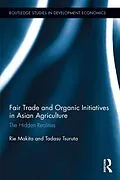Agricultural certification has emerged as a significant tool for promoting rural development in the global South. In contrast to studies that examine Fair Trade and organic certification as independent systems, this book reveals their joint application within actual production settings. The authors, who are both Asian, reveal the realities of applying Fair Trade and organic certification systems within Asian agriculture, challenging the fact that most Fair Trade studies by Western scholars tend to focus on Latin American and African producers. This pioneering study on double certification makes a significant contribution to studies on Fair Trade and organic agriculture beyond Asia.
Autorentext
Rie Makita is a Professor in the Faculty of International Social Sciences at Gakushuin University, Japan. Her publications include refereed articles on fair trade and organic agriculture in Development in Practice, Development Policy Review, Geoforum, and Asia Pacific Viewpoint.
Tadasu Tsuruta is a Professor in the Faculty of Agriculture at Kindai University, Japan. His publications include: "Socioeconomic Impact of Alternative Trade on Southern Thai Villages: A Case Study on the Production of Herbicide-Free Bananas for Japanese Consumers" for Perspective of Alternative Commodities Chain, 2008.
Zusammenfassung
In addition to constituting an evolving area of inquiry within the social sciences, agricultural certification, and particularly its Fair Trade and organic components, has emerged as a significant tool for promoting rural development in the global South. This book is unique for two reasons. First, in contrast to existing studies that have tended to examine Fair Trade and organic certification as independent systems, the studies presented in this book reveal their joint application within actual production settings, demonstrating the greater complexity entailed in these double certification systems through the generation of contradictions and tensions compared with single certification systems. Second, the authors, who are both Asian, reveal the realities of applying Fair Trade and organic certification systems within Asian agriculture. In doing so, they challenge the fact that most Fair Trade studies have been undertaken by Western scholars who have tended to focus on Latin American and African producers. Drawing on a wealth of grounded case studies conducted in India, Thailand, and the Philippines, this pioneering study on double certification makes a significant contribution to studies on Fair Trade and organic agriculture beyond Asia.
Inhalt
List of figures
List of tables
Acknowledgments
Abbreviations
1 Introduction
2 Fair Trade and organic agriculture: A case from South India
3 Fair Trade, organic, and genetically modified organisms: A case from Central India
4 Plantation management and workers: A case from Darjeeling, India
5 Social movements and commercial certification: A case from Thailand
6 Certification-supported farming and other diversified livelihoods: A case from the Philippines
7 Conclusion
Bibliography
Index
